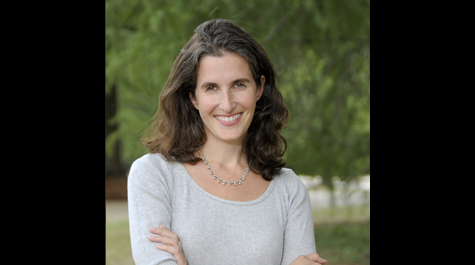Professor Rebecca Green named as a Reveley Interdisciplinary Faculty Fellow
As Co-Director of the Election Law Program, Professor Rebecca Green regularly goes beyond Law School boundaries, working with colleagues in a number of disciplines and areas of expertise.
So it comes as no surprise that Green, a Professor of the Practice at William & Mary Law School, was recently named a Reveley Interdisciplinary Faculty Fellow, the first law faculty member to receive this campus-wide honor.
“Professor Green is a wonderful person to serve as a Reveley Faculty Fellow given her interdisciplinary collaborative work,” said Davison M. Douglas, Dean and Arthur B. Hanson Professor of Law.
Green partners in this endeavor with Professor Robert Rose, Director of the College of William & Mary’s Center for Geospatial Analysis. In this collaborative project, the two will expand and enhance the course they designed last fall in which students learn GIS mapping software and the law of redistricting to engage real-world legislative redistricting problems. The class, which will run three semesters from 2018-2020, will perfectly position William & Mary students and graduates to participate in the next round of federal and state decennial redistricting.
As Professor Green wrote in a just-published William & Mary Law Review article, technology and growing public interest in redistricting reform will transform the public’s ability to participate in the process during the next round of redistricting.
“Educating students to understand the arcane law governing legislative redistricting and the software tools to accomplish it will propel William & Mary students into the forefront of the 2021 redistricting process,” Green wrote. “Whether they use these skills to serve state legislative line-drawers or redistricting commissions, nonprofits or good government groups, or whether they participate as informed and engaged citizens, Professor Rose and I are convinced that we are arming students to have meaningful impact in the next round.”
The Election Law Program is a joint project of William & Mary Law School and the National Center for State Courts. Green oversees the Program’s annual symposia and speaker series and undertakes a series of projects designed to educate judges about election law topics. In 2015, with generous funding from the Democracy Fund, Green began working on a series of State Election Law eBenchbooks.
Other projects have included co-founding Revive My Vote, a project to help Virginians with prior felony convictions regain the right to vote; producing Election War Games at state judicial conferences in Virginia, Colorado and Wisconsin; and supervising students on a variety of projects such as drafting an ABA report on 2012 election delays and research projects for the Presidential Commission on Election Administration. Green also serves as the faculty advisor to the student-run State of Elections blog.
Green teaches Election Law, as well as Privacy Law and Alternative Dispute Resolution courses. Her research interests focus on the intersection of privacy law and elections and the use of alternative dispute resolution in election processes.
Before earning her J.D. at Harvard Law School, Green earned a master’s degree in Chinese legal history from Harvard University and assisted with U.S.-China trade negotiations at the U.S. Trade Representative in Washington, D.C., during the Clinton Administration.
The Class of 2016 selected Green to receive the Walter Williams Jr. Memorial Teaching Award, presented annually to one professor by the graduating class in recognition of outstanding teaching.
The W. Taylor Reveley, III Interdisciplinary Faculty Fellows program began in August 2015 with a $2.6 million grant from The Andrew W. Mellon Foundation. The grant is named in honor of William & Mary President Taylor Reveley, who served more than 20 years on the Mellon Foundation Board of Trustees, including three years as chair. He is retiring as President of William & Mary in June 2018.
About William & Mary Law School
Thomas Jefferson founded William & Mary Law School in 1779 to train leaders for the new nation. Now in its third century, America’s oldest law school continues its historic mission of educating citizen lawyers who are prepared both to lead and to serve.
